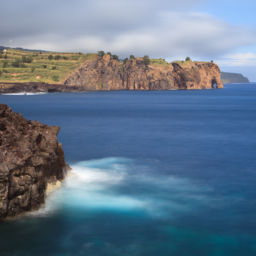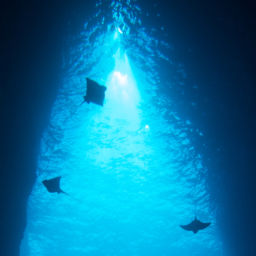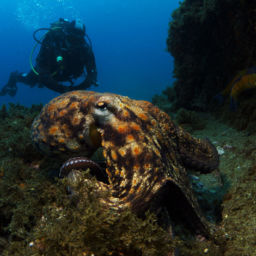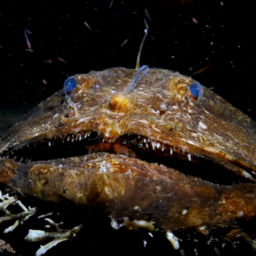The nine volcanic islands of the Azores puncture the vast North Atlantic Ocean 850 miles west of mainland Portugal. Among these tiny green isles is a hidden gem: Flores, the westernmost of the archipelago, and the perfect spot for a short outdoor getaway.
Although they feel a world away from anywhere else, the Azores are surprisingly easy to reach. I landed on Terceira after a mere 4-hour direct flight from Boston on Azores Airlines. From there it was a one-hour hop over to Flores, the westernmost of not only the Azores, but of Europe itself. The Azores is an autonomous region under Portuguese governance. All told, it was about 12 hours door-to-door from my home base of Detroit, Michigan, to Santa Cruz on Flores. With its population of just under 2,000 inhabitants, it’s the largest town on this 55-square-mile island, home to under 10,000 people total.
Arrival on Flores
Once we landed on Flores, we met our guide for the week, the owner of Flores Dive Center, Miguel Jeronimo. The dive shop, which Miguel runs out of his garage, and our guesthouse, also managed by the dive shop, are both in the tiny seaside town of Fajã Grande.
The lush island looks like a cross between Hawaii, Ireland and Middle Earth. We pass black volcanic cliffs, coursing with waterfalls on our way to Fajã Grande. A patchwork of terraced farm fields hugs the coast. Each postage-stamp shaped square is separated from the one next to it by a low stone wall, buried in blooming blue and purple hydrangeas. We descend into Fajã Grande, which hugs the west coast of the island — although there’s nothing “grande” about it.
A collection of whitewashed buildings with red tile roofs spills down to the seafront on the cobblestoned main road. There’s a church, a snack bar, waterfront restaurant, small grocery store, and not much else. The dramatic coastline is studded with ironshore, and just off shore is the wreck of the Papadiamandis. We’ve come to experience all the outdoor pursuits Flores has to offer, starting with the pastime that draws the most visitors: hiking.
Hiking on Flores
Most visitors come to Flores for the fantastic hiking, and rightly so. The tiny island boasts four official trails as well as the Grande Rota das Flores, a two-part, 29-mile (47 k) hike that encircles two-thirds of the island. Hikes range in length and difficulty from easy to multi-day challenges. Terrain ranges from relatively flat shoreline walks to steep ascents and descents. Hikers will see pastures and forests, calderas and seashore, lighthouses and small villages.
Although it didn’t necessarily qualify as a hike, shortly after arrival we took a 30-minute trek up a stone path to the waterfalls of Poço da Alagoinha. It was a scene straight out of “Jurassic Park.” I couldn’t have been more impressed had a pterodactyl actually soared over the top of cliff and alit in the pond below.
Canyoning on Flores
If you haven’t any idea what canyoning is, you’re not alone. Until we arrived at West Canyon Turismo Aventura, I too had no idea what we were in for. Canyoning participants gear up in wetsuits, helmets and a rock-climbing harness, then descend a sloped water course, walking through and along rivers and streams. As the waterways descend over cliffs or along boulders, canyoners abseil with ropes, jump, climb down or slide along natural stone waterslides. If it sounds like a challenge, it was — but in the best way.
Along with the rest of our tour group, who hailed from points as close as Belgium and as far as Colombia, we spent around three hours in the water. We traversed waterfalls and streams, climbed rocks and leapt into chilly, crystal-clear pools. As a finale, we zip-lined/rappelled off the highest waterfall of the course. We flew down the rope from the top of the falls at 60 feet (18 m) into the water below. Depending on your level of experience — and need for an adrenaline rush — West Canyon offers three different levels of canyoning tours. There’s one for beginners (our choice), one for intermediate guests, and one for those who wish to climb down 720-foot waterfalls and rappel 197 feet (60 m).
Diving on Flores
When it was time to splash in for a dive, my buddy and I, along with Miguel and his assistant Bruno, boarded one of Miguel’s boats, the Tomaine I, II, or III, each suited to different-sized groups. We did shore dives and boat dives, even venturing over to neighboring island Corvo to dive the marine reserve and tour the island’s caldera. Little Corvo Island has only 400 habitants, mostly in Caldeirão, the little seaside village. Even if you’re not diving, a day-boat trip from Flores makes for a great day out.
The highlight came on our last day of diving. We motored up the east coast to a site called Ilhéu do Garajau, which means “island of the terns.” The small island is thusly named because a colony of terns nests there every year.
We splashed into the 66 F (19 C) water near the small rock and descended to about 70 feet (21 m) where a recalcitrant hogfish peeped out from among the boulders. Riding the surge near the island’s sheer wall, we played with a school of gray triggerfish in the sunlight’s beams. Lots of small baitfish flittered about. A shy moray eel popped his head out of a crevice for a photo op. Further searching of the crevices revealed a scorpionfish as well. After pushing away from the wall for our safety stop, we surfaced satisfied that we’d seen all the best that nature had to offer on Flores.
How to Get There
Getting to the Azores from North America couldn’t be easier. Azores Airlines offers direct flights from Boston. You can fly from Toronto as well and from Montreal in July and August. There are also plentiful flights from Lisbon to the Azores each day.
Where to Stay
We stayed in a comfortable guesthouse, with a living room, three bedrooms and a full kitchen on Fajã Grande’s main road. It was close to both the dive shop and hiking opportunities. For other guesthouse options, check here or here.
Where to Eat
One of our favorite restaurants on the island was Pôr do Sol, in Lajes das Flores. Set in a converted stone cottage, it’s a great spot for sunset and traditional Portuguese food. If you’re diving, you’ll leave from Santa Cruz on one of Miguel’s boats. Just above the harbor is a great spot for lunch, Trancador. The restaurant serves sandwiches and soups, as well as killer desserts, all with a nice view of the water. Over in Fajã Grande, the charming Casa da Vigia is set into a whitewashed cottage. The menu features lots of international dishes like spaghetti Pomodoro and pad Thai, all vegetarian.


















